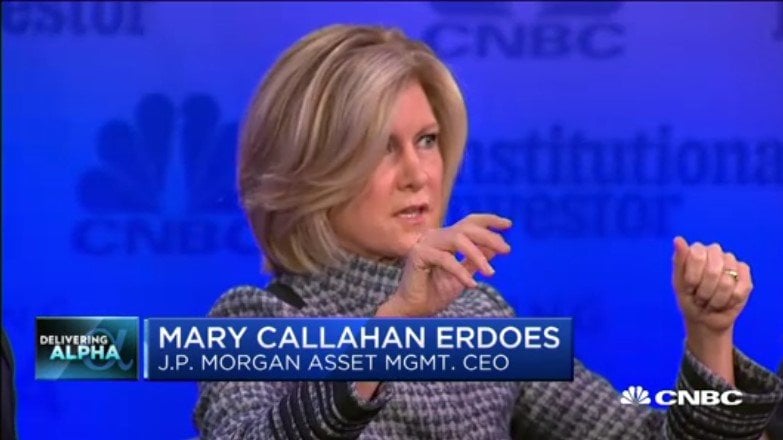Delivering Alpha full speech from Mary Erdoes – see more of our coverage here
Q2 hedge fund letters, conference, scoops etc
[00:00:00] Female 1: And so you asked the most important question what’s going to move the market as a trader is it interest rates? For starters the entire world is priced on the interest rate market so that is by definition the most important thing. That’s all priced in, every scenario has been stress tested and thought through and the markets price that in daily. Every 50 billion, 200 billion, 400 billion, all those numbers that’s also been stress tested, thought through and has total risk priced into the market. So it’s neither of those two things that’s actually going to be the things that do it.Then it’s in my opinion the second or third derivative of either one of those, it’s not those in on themselves it’s what else it spills over to cause. So when you think of tariffs on China you have to think through if you put tariffs on the computer industry in China you’re only hurting 15% of the companies there are Chinese, 85% of them are US and other multinationals that are going to be hurt. So then what does that do, what does that do to the rest of Asia? What does it do to US companies who don’t have pressing pressure to rate their prices, now you have other inflation.
So you cascade into the second or third derivatives which are the hardest things for people to think through. Why? Because we haven't had a trade war in 50 years. Why? Because we’ve had one take it easy as much as we’ve seen coordinated around the world and now the second part of that is we’ve never had the task of having to take that back. We’ve never had negative interest rates in half of Europe and half of Japan and we’ve never had globalisation to the rate it is.
So we have a lot of never haves so you can’t back test and you have to scenario analysis and war room these things. It’s very difficult to think through the second and third derivatives. So it won’t be interest rates and whether they raise 25 basis points every other meeting or not and it won’t be the [inaudible 00:02:04]. It will be the bigger deltas where the second or third derivative of these things that will be hard to calculate.
[00:02:07] Female 2: And the impact on investing is what? The impact of asset allocation is what? When you’re rolling that out ultimately the advice that you’re telling to clients is... [00:02:20] Female 1: Is just the opposite of what we’ve been saying for the past 8 years. It is- every moment since the financial crisis of 2008 our job as financial advisors is to help clients to rerisk when it was uncomfortable to do so. Mark Lowry put 80 billion dollars to work in distressed assets when it was very difficult to do so. You have to get people out of their comfort zone to be able to do that.Well they’ve done it and now they’re very comfortable doing it and they say there’s a crisis on the horizon os they’re even more comfortable. No one is really assessing their portfolio and saying hang on that growth portfolio that I have a small allocation to is now a very big allocation because it’s up 17% year to date. How do I think about that and why would I take the money off the table now it feels like there’s nothing really that’s forcing you to do that.
[00:03:22] Female 2: So is the market going to if we were to tweet something on our phone, to flash something out [inaudible 00:03:28] says time to de-risk the portfolio? [00:03:33] Female 1: Time to take a summer look at your portfolio and make sure you are not holding your skews where you didn’t realise it.Read the full article here.






